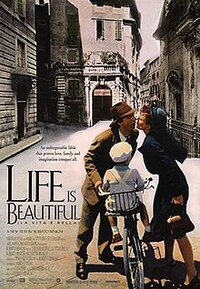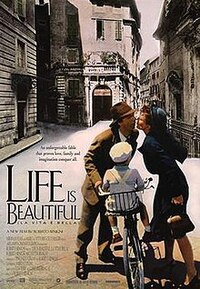- Expression
- Δισδιάστατη κινούμενη εικόνα
- Ιταλικά
- 6 November 1998
-
- The film was praised by the Italian press, with Benigni treated as a "national hero."[14] Pope John Paul II, who received a private screening with Benigni, placed it in his top five favourite films.[14] It holds a "Fresh" 81% approval rating on review aggregation website Rotten Tomatoes, based on 93 reviews with an average rating of 7.5/10. The site's consensus reads: "Benigni's earnest charm, when not overstepping its bounds into the unnecessarily treacly, offers the possibility of hope in the face of unflinching horror".[26] Metacritic assigned the film a weighted average score of 59 out of 100, based on 32 critics, indicating "mixed or average reviews".[27] Roger Ebert gave the film 3.5/4 stars, stating: "[According to Benigni] the movie has stirred up venomous opposition from the right wing in Italy [and at] Cannes, it offended some left-wing critics with its use of humor in connection with the Holocaust. What may be most offensive to both wings is its sidestepping of politics in favor of simple human ingenuity. The film finds the right notes to negotiate its delicate subject matter ... The movie actually softens the Holocaust slightly, to make the humor possible at all. In the real death camps there would be no role for Guido. But Life Is Beautiful is not about Nazis and Fascists, but about the human spirit. It is about rescuing whatever is good and hopeful from the wreckage of dreams. About hope for the future. About the necessary human conviction, or delusion, that things will be better for our children than they are right now."[28] Michael Wilmington of the Chicago Tribune gave the movie a score of 100/100, calling it: "A deeply moving blend of cold terror and rapturous hilarity. Lovingly crafted by Italy's top comedian and most popular filmmaker, it's that rare comedy that takes on a daring and ambitious subject and proves worthy of it."[29] Richard Schickel, writing for Time, argued, "There are references to mass extermination, but that brutal reality is never vividly presented". He concluded that "even a hint of the truth about the Holocaust would crush [Benigni]'s comedy."[30] Owen Gleiberman of Entertainment Weekly gave it a B−, calling it "undeniably some sort of feat—the first feel-good Holocaust weepie. It's been a long time coming." However, Glieberman stated: "There's only one problem. As shot, it looks like a game".[31] Michael O'Sullivan, writing for The Washington Post, called it "sad, funny and haunting."[32] Nell Minow of Common Sense Media gave it 5/5 stars, saying: "This magnificent film gives us a glimpse of the Holocaust, but it is really about love, and the indomitability of humanity even in the midst of inhumanity."[33] Janet Maslin wrote in The New York Times that the film took "a colossal amount of gall" but "because Mr. Benigni can be heart-rending without a trace of the maudlin, it works."[19] The Los Angeles Times's Kenneth Turan noted the film had "some furious opposition" at Cannes, but said "what is surprising about this unlikely film is that it succeeds as well as it does. Its sentiment is inescapable, but genuine poignancy and pathos are also present, and an overarching sincerity is visible too."[34] David Rooney of Variety said the film had "mixed results," with "surprising depth and poignancy" in Benigni's performance but "visually rather flat" camera work by Tonino Delli Colli.[16] In 2002, BBC critic Tom Dawson wrote "the film is presumably intended as a tribute to the powers of imagination, innocence, and love in the most harrowing of circumstances," but "Benigni's sentimental fantasy diminishes the suffering of Holocaust victims."[35] In 2006, Jewish American comedic filmmaker Mel Brooks spoke negatively of the film in Der Spiegel, saying it trivialized the suffering in concentration camps.[36] By contrast, Nobel Laureate Imre Kertész argues that those who take the film to be a comedy, rather than a tragedy, have missed the point of the film. He draws attention to what he terms 'Holocaust conformism' in cinema to rebuff detractors of Life Is Beautiful.[37] Israeli screenwriter, author and art critic Kobi Niv published the book Life Is Beautiful, But Not for Jews (in 2000 in Hebrew and an English translation in 2003) in which he analyzed the movie from a highly critical perspective, suggesting that the film's underlining narrative is harmful for Jews.[38] Another academic analysis of the movie was undertaken by Ilona Klein, who analyzes the film's success and refers to the "ambiguous themes hidden within." Klein suggests that one of the reasons the movie was so successful was its appeal of "sentimental optimism". At the same time, she points out that "Miramax's hype billed this film as a fable about 'love, family, and the power of imagination,' yet most Jewish victims of the Nazis' 'Final Solution' were loving, concerned, devoted parents. No amount of love, family, and power of imagination helped their children survive the gas chambers."[39] David Sterritt of The Christian Science Monitor highlighted that "Enthusiasm for the movie has not been as unanimous as its ad campaign suggests, however, and audiences would do well to ponder its implicit attitudes." He pointed out that the movie implicitly suggests quick-witted confidence was a match for the terrors of fascist death camps, then added that "[Benigni's] fable ultimately obscures the human and historical events it sets out to illuminate."[40] The movie also received criticism, for the scene of the US Army Sherman M4 Tank coming to liberate the concentration camp. However, Auschwitz was liberated by Red Army and Belsen was liberated by British Army.[41] Although there were Internet users who claimed that this scene was a historical revisionism made to make it easier to win an Oscar, Roberto Benigni denied these claims.[42] ⟶ wikipedia
-
-
In 1939, in Fascist Italy, Guido Orefice is a young Italian Jewish man who arrives to work in the city of Arezzo, in Tuscany, where his uncle Eliseo works in the restaurant of a hotel. Guido is comical and sharp and falls in love with a Gentile girl named Dora. Later, he sees her again in the city where she is a teacher and set to be engaged to Rodolfo, a rich but arrogant local government official with whom Guido has regular run-ins. Guido sets up many "coincidental" incidents to show his interest in Dora. Finally, Dora sees Guido's affection and promise and gives in, against her better judgment. He steals the lady from her engagement party, on a horse, humiliating her fiancé and mother. They are later married, have a son Giosuè, and run a bookstore.
⟶ wikipedia
-



